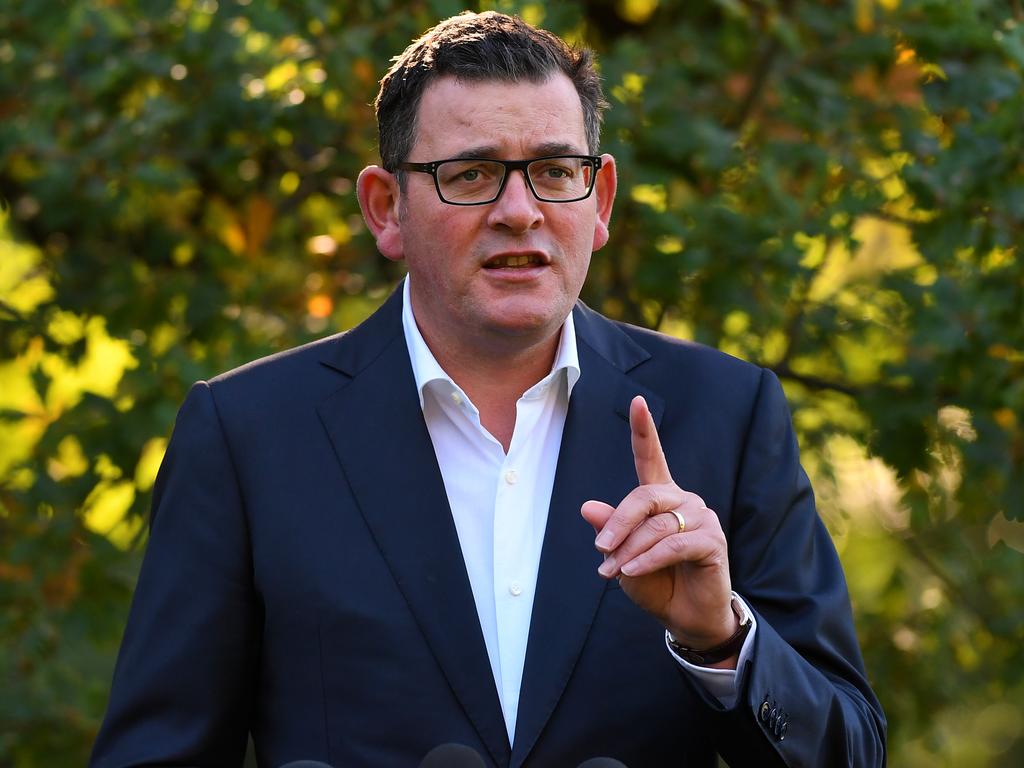Joe Hildebrand on the week’s most ‘disgraceful’ coronavirus ban
A new day, a new limit on what Aussies can and can’t do. But one state took the mantle this week for imposing the most ridiculous virus measure.

Empires are built by the hard and hungry, and lost when they become docile and decadent. Those in jackboots will always defeat those in ugg boots.
It is hard to believe that in a little over two centuries, the USA has gone from being a handful of colonists who declared war on the mightiest power on the planet to a global superpower now unwilling to accept any casualties from foreign excursions.
The same is of course true throughout the West, and nowhere more so than in Australia.
Anyone under the age of 29 in this country has never lived through a recession, let alone a war. Their parents were the last generation to face the prospect of being sent to war and they protested endlessly against it until the threat was removed. The World War II generation is now all but gone – there were only 13,000 living veterans this time last year. The generation before that had to live through the triple horror of the Great War, the Spanish flu and the Great Depression.
In short, we live in a period of unprecedented peace and prosperity and almost all of us have known nothing but. Our mistake was to assume it was normal.
Little wonder then that the coronavirus outbreak has caused such panic in Australia and triggered such an astonishing government response – an oddly dissonant mix of extreme restrictions on movement and socialisation by the states combined with apparently limitless rivers of money and relief from the commonwealth.
It’s a bit like being treated by two doctors at once: One who chops your legs off and another who provides the prosthetics.
Of course, I completely understand and support the need to manage the rise in coronavirus cases to stop the hospital system from being overrun. If that should happen, we will go from the unhappy tally of inevitable deaths to the more tragic count of avoidable ones.
And like most people I am abiding by the social restrictions and putting my faith in both levels of government acting on the sum of expert advice.
But it remains a deeply cynical faith – if such a thing can logically exist – and one that is tested daily.
It is bone-chilling, for example, that Victoria thought it acceptable to ban people in a relationship from seeing each other if they did not live in the same house. It is hard to think of a creepier government overreach into people’s personal lives.
RELATED: All the latest on the coronavirus
RELATED: Joe Hildebrand on the two questions virus critics should ask

And the fact that the ban was quickly lifted only makes it more troubling: Was this deadly practice for five minutes and totally fine a few hours later?
Obviously not, which raises the question of how any public leader in a liberal democracy could think this level of control over people’s private lives was ever acceptable.
It is disturbing – no, disgraceful – that a state could even contemplate let alone enact a rule whose only conceivable precedent is the criminalisation of homosexuality.
The cost of fighting coronavirus must always be measured against costs we do not yet know. It is now clear some in government are prepared not just to break the economy but to break hearts. I would say life without love is hardly worth living, but maybe I’m just a romantic.
As for the more seasoned and cynical in the world, they might say wiping out the entire global economy – with all the future deaths and misery that will inevitably follow – is perhaps an overreaction to a virus that is bad and deadly but far from the worst or deadliest thing facing the world at the moment.
By way of example, the death rate of corona at the time of writing was over 50,000. By contrast, almost 10 million people die of cancer each year – 70 per cent in low- to middle-income countries – according to the World Health Organisation. Heart disease kills 18 million.
And the vast majority of coronavirus deaths are people already suffering from cancer or heart disease or some other medical condition. In many cases it is actually this condition that is the major contributing factor to their death, even though it is counted as a coronavirus fatality. And in Italy, the worst hit country, the average age of death is almost 80.
RELATED: Joe Hildebrand asks what is appropriate on public transport
RELATED: Joe Hildebrand on the real cost of the coronavirus crisis

None of this is to say we should just let people die but it is important to remember that people do die, often at a far younger age and in far greater numbers than from the disease we are stopping the world to fight.
It is also vital to remember that the aim of our strategy is not to save every soul but to save our hospitals. The major concern is that if hospital beds are overrun then those who could recover will be denied the care and equipment they need. And if the hospitals are full with corona patients it makes it even harder to treat everybody else. Likewise it is important for at-risk people to get a flu vaccine so they are not taking up beds that could be used for corona patients.
In other words, this is not a moral crusade, it is a numbers game. People compare the fight against corona to a war but we are not trying to wipe out the enemy, we are trying to manage it.
As US General Omar Bradley said, in war only amateurs worry about strategy – professionals worry about logistics. The most important number in this fight is the difference between the number of victims and the number of ventilators.
And yet there seems to be an evangelical zeal in the imposition of ever-increasing restrictions, even as the curve appears to be flattening and the battle appears to be turning as a result of measures taken days and weeks ago.
And some of these crackdowns seem to be based far more on public and political panic than calm and considered advice. One wonders what the medical opinion is on banning couples from bonking in Victoria or fining someone $1000 for eating a kebab on a bench in NSW or using drones to disperse parkgoers in WA.
Even more perplexing are those who are openly calling for the government to place even harsher restrictions on them – as though they have some kind of political bondage fetish.
Already we have become a housebound nation. We have become so fearful for our lives we have forsaken our freedom and outsourced our free will.
We might be able to tolerate this deprivation of liberty but we should never embrace it. And there must be constant pressure on the state to restore what it has taken at the first possible opportunity, not as a last resort.
After all, the only just wars are waged for freedom. If we lose that then there is not much left to fight for.
Joe Hildebrand in news.com.au’s editor at large. He co-hosts Studio 10, weekdays from 8am on Channel 10 | @joe_hildebrand




